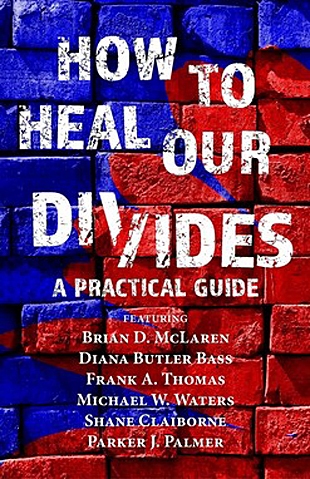This book has so many tools and ideas for healing communities that one review is not enough, but we will try.
Brian McLaren, one of our Living Spiritual Teachers, sets the stage, explaining why we so easily become persistently polarized and why divisions only seem to intensify. (See the excerpt accompanying this review.)
Diana Butler Bass, another Living Spiritual Teacher, explains that only by healing our divides will we heal ourselves.
Frank A. Thomas, director of the PhD Program in African American Preaching and Sacred Rhetoric at Christian Theological Seminary in Indianapolis, and Michael W. Waters, pastor of Abundant Life A.M.E. Church in Dallas, address the rise of racism in the United States. It is nothing new, they emphasize, and “before we can heal these divides, we must take full inventory of the roots from which they spring” (Waters). Calenthia Dowdy, director of Faith Initiatives at Philadelphia FIGHT Community Health Centers, also explains Roots of Justice, an anti-racism analysis training program.
All the contributors are stellar. To mention a few others, Rev. Brandan Robertson — founder and spiritual leader of the global digital faith community Metanoia — writes about conversation and friendship with transforming power. So do contributors Seth Henderson and Erik Gross — both from the Aspen Institute – emphasizing that “winning” needs to become less important when we disagree with one another. Shane Claiborne, a leading figure in the New Monasticism movement, says that transformation of any kind “begins with humility.”
Some chapters are very practical. Rich Tafel, a pastor in Washington, DC, explains how to make a church like “a start up,” including how to create, coach, and train “entrepreneurial cohorts” to teach, connect, and spark change in members and the surrounding community.
Parker J. Palmer, another of our Living Spiritual Teachers, offers stages for individuals to discover “an undivided life” — with which we are prepared to be agents of healing broken institutions and broken relationships. Contributor Molly LaCroix, a marriage and family therapist, writes on a similar topic, offering the Internal Family Systems model as a way of understanding our inner conflict, in order to avoid and then heal conflict with others. “Healing divides requires engagement grounded in curiosity and compassion. We must be able to see the person on the other side.”
There is much more. We recommend this book to you if you are involved, or looking to become involved, in healing relationships in the communities of your life. Most of the contributors appear to be Christian in background and orientation, but with a progressive worldview that makes their ideas and practices applicable to a wider audience.
